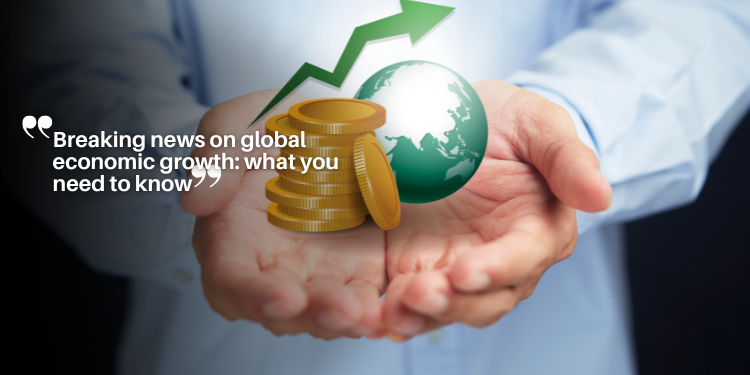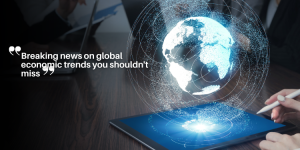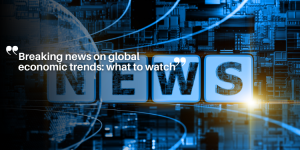Breaking news on global economic growth: what you need to know

Breaking news on global economic growth highlights the importance of key indicators like GDP, unemployment rates, and geopolitical events, while businesses must adapt through technology and understanding consumer needs.
Breaking news on global economic growth shows us that changes are on the horizon. But how can we make sense of these updates in our daily lives? Let’s dive in and explore what this means for us.
Current trends in global economic growth
Understanding the current trends in global economic growth is essential for businesses and individuals alike. These trends shape the way economies function and influence decisions across various sectors.
One of the most significant influences on global growth is technological advancement. Technology not only boosts productivity but also creates new markets and job opportunities. As companies adopt innovations like artificial intelligence and automation, they can increase efficiency and lower costs.
Shifts in Consumer Behavior
Alongside technology, shifts in consumer behavior are also pivotal. Today’s consumers are more informed and expect personalized experiences. This evolution requires businesses to adapt quickly. Companies that utilize data analytics can better meet their customers’ needs.
Global Trade Dynamics
Another crucial factor is the dynamics of global trade. Trade policies and agreements can significantly impact economic growth. Nations engaging in cooperative trade often see stronger growth due to increased market access.
- Trade agreements: Strengthening relationships between countries.
- Tariffs: Examining their effect on prices and availability.
- Supply chain shifts: Moving closer to home or diversifying suppliers.
In addition, geopolitical events can disrupt economic trends. Events like elections, conflict, or policy changes can lead to uncertainty in markets. Investors and businesses need to stay informed and adaptable.
As we analyze these trends, it becomes clear that the global economy is interconnected. Changes in one part of the world can ripple throughout the rest. Understanding these connections helps businesses make informed decisions.
As we look ahead, being aware of current trends enables organizations to strategize effectively. This awareness supports resilience in an ever-changing economic landscape.
Key indicators to monitor
Monitoring the key indicators of economic growth is vital for understanding market dynamics. These indicators help businesses and individuals make informed decisions. By analyzing them, we can gauge the health of the economy and anticipate future trends.
One of the most critical indicators is the Gross Domestic Product (GDP). GDP measures the total value of goods and services produced over a specific period. A rising GDP usually signals a growing economy, while a decline may indicate recession. This data is essential for assessing national economic performance.
Unemployment Rates
The unemployment rate is another significant metric to watch. It reflects the percentage of the workforce that is jobless and actively seeking work. A low unemployment rate often correlates with a robust economy, suggesting businesses are hiring and expanding.
- Inflation Rate: High inflation can erode purchasing power.
- Consumer Confidence Index: This measures how optimistic consumers feel about the economy.
- Retail Sales Data: Strong retail sales indicate consumer spending, a key driver of growth.
Additionally, the balance of trade provides insights into a country’s economic relationship with the world. It reflects the difference between exports and imports. A trade surplus means a country exports more than it imports, which can lead to economic growth.
Finally, monitoring interest rates is essential as they influence borrowing and spending. Lower interest rates can stimulate economic activity by making loans cheaper, encouraging investment and consumer spending.
By paying attention to these key indicators, businesses can adapt their strategies in response to changing economic conditions. Understanding these dynamics is crucial for anyone looking to navigate the complexities of the global economy.

The impact of geopolitical events
The impact of geopolitical events on the economy is profound and far-reaching. When countries engage in conflicts, elections, or forge alliances, the economic effects can be significant and immediate. These events influence market stability, trade relationships, and investor confidence.
For instance, when tensions rise between nations, businesses may hesitate to invest in affected regions. This hesitation can lead to a decrease in economic activity and growth. Economic sanctions imposed on a country can also have a cascading effect, leading to reduced trade and impacting global supply chains.
Effects on Trade and Investment
Changes in government or policy can dramatically alter trade agreements. New leadership might renegotiate deals, potentially leading to either favorable or unfavorable conditions for businesses. When countries impose tariffs, prices may rise and consumer choices become limited.
- Disruption of markets: Events can cause stock market fluctuations.
- Investment shifts: Investors may seek safer options during instability.
- Currency volatility: Political unrest can affect currency values.
Additionally, global events like pandemics or natural disasters can also be categorized under the geopolitical umbrella. These occurrences can disrupt logistics, affect labor supply, and have long-term economic consequences.
A stable geopolitical environment promotes a conducive atmosphere for economic growth. Confidence among investors rises, leading to increased spending on infrastructure, innovation, and job creation. Therefore, keeping an eye on geopolitical developments is crucial for understanding how they will influence global economic growth.
Strategies for businesses to adapt
To thrive in a changing economic landscape, businesses must employ effective strategies to adapt. These strategies allow organizations to respond swiftly to market shifts and stay competitive.
One essential approach is to invest in technology. By adopting modern systems and tools, businesses can enhance efficiency and streamline operations. For example, cloud computing and automation can significantly reduce costs and time.
Understanding Consumer Needs
Another vital strategy is to focus on understanding consumer needs. Regular market research helps companies stay in touch with their audience. By gathering feedback and analyzing consumer behavior, businesses can tailor their products and services to meet changing demands.
- Agility in operations: Being flexible allows quick adjustments to new trends.
- Innovation: Emphasizing creativity leads to better products and services.
- Diversity in offerings: Expanding product lines can capture more market segments.
Moreover, forming strategic partnerships can also help businesses adapt. Collaborating with other companies allows for sharing resources and reaching wider audiences. For instance, joint ventures often combine expertise and open new markets, fostering growth even during economic uncertainty.
Finally, maintaining a strong brand presence is crucial. Engaging with customers through social media and marketing helps build loyalty. When consumers feel connected to a brand, they are more likely to remain loyal, even in challenging times.
Overall, businesses that can quickly adapt to global economic changes will have a competitive advantage. These strategies not only help mitigate risks but also position companies for long-term success.
FAQ – Frequently Asked Questions about Global Economic Growth
What are the key indicators of economic growth?
Key indicators include GDP growth, unemployment rates, inflation rates, and consumer confidence.
How do geopolitical events impact economic growth?
Geopolitical events can create market instability, affect trade policies, and alter investor confidence, influencing overall economic performance.
What strategies can businesses use to adapt to economic changes?
Businesses can invest in technology, understand consumer needs, form strategic partnerships, and maintain a strong brand presence to adapt.
Why is it important for companies to monitor consumer trends?
Monitoring consumer trends allows businesses to tailor their offerings, meet changing demands, and enhance customer satisfaction.







